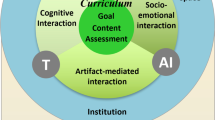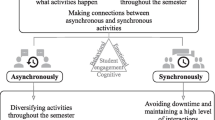Abstract
Online study collaboration is a recent professional development approach that goes beyond school and regional boundaries and even helps reach rural schools in China. In this study, we focused on a specific online study collaboration program to examine its potential benefits for improving participating teachers’ expertise in instructional design. Data were collected from the online study collaboration organizers and four main participating schools. The results reveal the program’s well-structured process and organization for planning and conducting the online study collaboration. Participating teachers benefited from their sharing and discussions with experts and other teachers. Their instructional designs show many important changes that are aligned with experts’ comments. Selected teachers’ expertise improvement includes their knowledge about the textbook and content, their perspectives about students’ learning and instruction, and their learning of different instructional approaches to engage students in classroom instruction. The use of online study collaboration for improving teachers’ expertise and the study’s limitations are then discussed.


Similar content being viewed by others
Notes
All the names used here or in the other places of this article are pseudonyms.
References
Berliner, D. C. (2001). Learning about and learning from expert teachers. International Journal of Educational Research, 35, 463–482.
Borba, M. C., & Gadanidis, G. (2008). Virtual communities and networks of practicing mathematics teachers—the role of technology in collaboration. In K. Krainer & T. Wood (Eds.), Participants in mathematics teacher education (pp. 181–206). Rotterdam: Sense.
Chi, M. T. H. (2011). Theoretical perspectives, methodological approaches, and trends in the study of expertise. In Y. Li & G. Kaiser (Eds.), Expertise in mathematics instruction (pp. 17–39). New York: Springer.
Grugeon, B., Lagrange, J.-B., Jarvis, D., Alagic, M., Das, M., & Hunscheidt, D. (2010). Teacher education courses in mathematics and technology: Analyzing views and options. In C. Hoyles & J.-B. Lagrange (Eds.), Mathematics education and technology—rethinking the terrain (pp. 329–345). New York: Springer.
Hoyles, C., & Lagrange, J.-B. (Eds.). (2010). Mathematics education and technology–rethinking the terrain: The 17th ICMI study. New York: Springer.
Lerman, S., & Zehetmeier, S. (2008). Face-to-face communities and networks of practicing mathematics teachers—studies on their professional growth. In K. Krainer & T. Wood (Eds.), Participants in mathematics teacher education (pp. 133–153). Rotterdam: Sense.
Li, J. (2008). Curriculum development in China. In Z. Usiskin & E. Willmore (Eds.), Mathematics curriculum in Pacific Rim countries: China, Japan, Korea, and Singapore (pp. 127–140). Charlotte: Information Age.
Li, Y. (2007). Curriculum and culture: An exploratory examination of mathematics curriculum materials in their system and cultural contexts. The Mathematics Educator, 10, 21–38.
Li, Y., Chen, X., & Kulm, G. (2009). Mathematics teachers’ practices and thinking in lesson plan development: a case of teaching fraction division. ZDM—The International Journal on Mathematics Education, 41, 717–731.
Li, Y., Huang, R., Bao, J., & Fan, Y. (2011). Facilitating mathematics teachers’ professional development through ranking and promotion in Mainland China. In N. Bednarz, D. Fiorentini, & R. Huang (Eds.), The professional development of mathematics teachers (pp. 72–85). Ottawa: University of Ottawa Press.
Li, Y., Huang, R., & Yang, Y. (2011). Characterizing expert teaching in school mathematics in China: A prototype of expertise in teaching mathematics. In Y. Li & G. Kaiser (Eds.), Expertise in mathematics instruction (pp. 167–195). New York: Springer.
Li, Y., & Kaiser, G. (Eds.). (2011). Expertise in mathematics instruction. New York: Springer.
Li, Y., & Li, J. (2009). Mathematics classroom instruction excellence through the platform of teaching contests. ZDM—The International Journal on Mathematics Education, 41, 263–277.
Liu, J., & Li, Y. (2010). Mathematics curriculum reform in the Chinese mainland: Changes and challenges. In F. K. S. Leung & Y. Li (Eds.), Reforms and issues in school mathematics in East Asia (pp. 9–31). Rotterdam: Sense Publishers.
Ma, L. (1999). Knowing and teaching elementary mathematics: Teachers’ understanding of fundamental mathematics in China and the United States. Mahwah: Lawrence Erlbaum.
Paine, L., & Ma, L. (1993). Teachers working together: A dialogue on organizational and cultural perspectives of Chinese teachers. International Journal of Educational Research, 19, 675–697.
Sherin, M., Jacobs, V., & Philipp, R. (Eds.). (2010). Mathematics teacher noticing: seeing through teachers’ eyes. New York: Routledge.
Vygotsky, L. S. (1978). Mind in Society. Cambridge: Harvard University Press.
Wertsch, J. V. (1998). Mind as action. New York: Oxford University Press.
Wong, J. L. N. (2010). What makes a professional learning community possible? A case study of a mathematics department in a junior secondary school of China. Asia Pacific Education Review, 11, 131–139.
Yang, Y. (2009). How a Chinese teacher improved classroom teaching in Teaching Research Group: A case study on Pythagoras theorem teaching in Shanghai. ZDM—International Journal on Mathematics Education, 41, 279–296.
Acknowledgments
We would like to thank the New Century textbook writing group for their support and assistance in the process of collecting the Chinese data. We are also grateful to all the participants, especially these two teachers in focus, for their time and participation.
Author information
Authors and Affiliations
Corresponding author
Rights and permissions
About this article
Cite this article
Li, Y., Qi, C. Online study collaboration to improve teachers’ expertise in instructional design in mathematics. ZDM Mathematics Education 43, 833–845 (2011). https://doi.org/10.1007/s11858-011-0355-0
Accepted:
Published:
Issue Date:
DOI: https://doi.org/10.1007/s11858-011-0355-0




